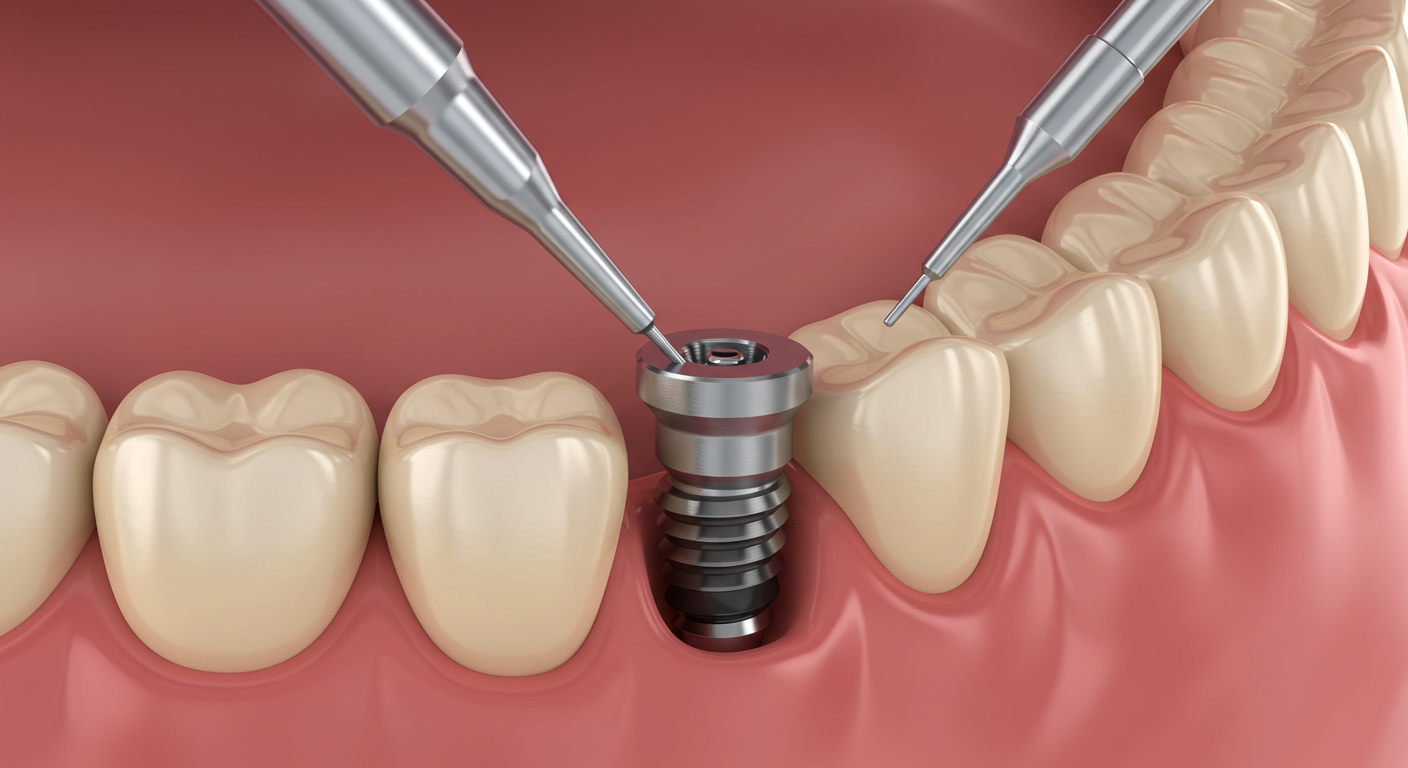Contents

Dental Implant Surgery: A Complete Guide
Dental implant placement is a standard medical procedure, performed under local anesthesia by an implantology specialist, which allows for the replacement of one or more missing teeth while preserving the integrity of neighboring teeth. The fundamental principle is based on inserting an artificial root that serves as a support for a future dental crown or prosthesis. This procedure is carried out in two distinct stages.
During the first surgical intervention, the practitioner makes a gingival incision at the planned implant site. The implant is then screwed into the location where the tooth root was. A healing period of a few months is necessary before the second intervention, which consists of installing the artificial tooth, whether it's a crown, a bridge, or a prosthesis.
Definition and Principles
The dental implant is an effective solution for filling a tooth gap. The advantages are numerous: regaining normal chewing function and the pleasure of smiling without self-consciousness. This minor surgical procedure does not present major risks when performed under optimal hygiene conditions and with modern equipment.
A dental implant serves to replace one or more missing teeth without compromising the surrounding healthy teeth. It is essentially an artificial root intended to support a dental prosthesis. Concretely, the implant is a screw made mainly of titanium or zirconia. Its quality generally allows for an unlimited lifespan.
Contraindications and Pre-evaluation
Certain situations require special attention. Good general health and a healthy mouth are essential. Specific contraindications exist for certain cases:
- Patients with severe heart conditions
- Diabetic individuals (if uncontrolled)
- Pregnant women (procedure to be postponed until after pregnancy)
Only the dentist can assess the feasibility of the procedure based on your health status.
Potential Complications
Complications related to this procedure are very rare and generally do not present a major risk. Post-operative infection is the most common complication, easily treated with antibiotics in a few days. The risk of implant failure is low, typically under 5%.
Advantages of Implantology
Dental implants offer several undeniable advantages:
- Proven effectiveness with high success rates
- Completely safe for adjacent teeth
- Excellent durability and lifespan
- Remarkable aesthetic result
Unlike a traditional bridge, it preserves potentially healthy neighboring teeth.
Financial Aspects
The cost varies depending on several factors:
- Number of teeth to be replaced
- Materials used
- Type of implant chosen
A detailed quote is always provided before any treatment. The procedure is considered a major service, and dental insurance may cover a portion of these costs, but a significant out-of-pocket expense often remains.
Prosthetic Options
Fixed Prosthetics
- The Crown:
- Available in resin, metal, or ceramic
- Covers the implant, mimicking the natural tooth
- The Implant Bridge:
- Solution for several missing teeth
- Uses implants as support for a multi-tooth restoration
- The Full Fixed Prosthesis (e.g., All-on-4):
- Alternative to traditional dentures
- Requires several strategic implants
- More expensive but requires less daily maintenance
Removable Prosthetics
- Attachment system using snaps on implants (Overdenture)
- More economical option than a fixed prosthesis
- Requires rigorous daily maintenance
Alternatives to Implants
Other solutions exist:
- Conventional dental bridge (requires grinding down adjacent teeth)
- Removable partial denture with clasps
- Traditional complete denture
Prevention Tips
Tooth loss can have various origins:
- Fracture
- Dislocation
- Untreated cavity
- Infection
To avoid these situations:
- Maintain strict oral hygiene
- Brush your teeth at least twice a day
- Use fluoride toothpaste
- Rinse with water after each meal
- Use sugar-free chewing gum if brushing is not possible
- Wear a mouthguard during at-risk sports activities
Perform regular dental check-ups:
- Annually before age 60
- Semi-annually after age 60
In case of pain or symptoms, consult your practitioner promptly without waiting for the condition to worsen.
